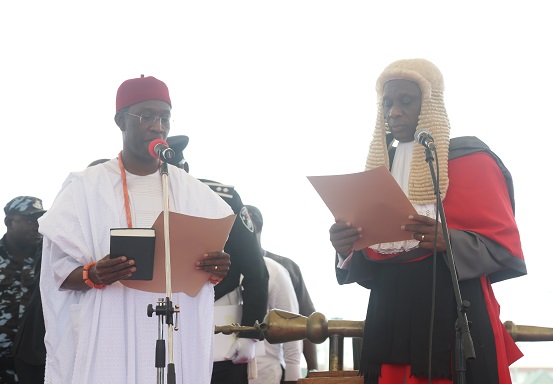Obodo Ejiro
China and Nigeria are both giants on their different
continents: Asia and Africa. Both were regarded as sleeping giants for decades;
but while China has woken up and made remarkable progress, Nigeria lags behind.
Though Nigeria has attained the status of biggest economy in
Africa, the truth remains that size matters less when there is widespread
poverty, inequality, decomposing infrastructure and an economy that stutters
small businesses.
A shot at greatness
China’s journey to economic ‘super-power-ship’ is a
brilliant tale of long term commitment to development planning, reform, sweat
and sacrifice. But there was a time when Nigeria was ahead of China on several
economic indicators.
For instance, from 1960 to 1985, Nigeria’s per capita income
was consistently higher than that of China. China’s per capita income was just
22% of Nigeria’s in 1980 (Nigeria: $871 versus China: $193) and that was the
case for many year. But things have changed dramatically. Last year, Nigeria’s
per capita income was 42% of China’s (Nigeria: $3,185 versus China: $ 7,594).
In recent times there have been fears that after three
soaring decades of growth, China is on the decline. However the rate of growth posted by the
country in the last three decades has continued to fascinate economists.
China grew its economy by an average of 9.82% in the last 36
years, becoming the second largest economy in the world in 2010. The World Bank
famously says China pulled 500 million people out of poverty in the last three
decades. Already, it is projected that China’s economy will surpass that of the
United States by 2025. But how did China attain this feat?
China’s ascent began in the late 1970s when it finally
embraced on market reforms as opposed to pure central planning. This became
necessary because in the 1960 and early 1970s, while China's neighbours were
industrializing and making serious progress, its citizens could hardly feed or
cloth themselves properly.
It was obvious that the country had to head in the direction
of its more liberal Asian neighbours (including Japan, the Republic of Korea,
Singapore, Taiwan, and Hong Kong). The way to do this was to reform.
Reforms in China did not immediately mean that it dumped
communism; however, minor adjustments were made to the country’s development
strategy. For China it was an experiment: New ideas were introduced in small
localities and if they worked, the whole country adopted them.
Like most modern development successes, China made creative
use of short and long term development planning.
The period between 1979 and 1989, which marked the beginning
of the reform process, was designated the “period of readjustment.” During that period, key imbalances in China’s
economy were corrected and a foundation was to be laid for a well-planned
modernisation drive.
The major goal of the readjustment process was to expand
exports rapidly; overcome key deficiencies in transportation, communications,
coal, iron, steel, building materials, and electric power; and redress the
imbalance between light and heavy industry by increasing the growth rate of
light industry and reducing investment in heavy industry.
In 1984, China made a significant move to designate fourteen
of its largest coastal cities commercial and industrial centers. The aim was to
create productive exchanges between foreign firms with advanced technology and
major Chinese economic networks. These centers have since grown to become large
export hubs.
Over the period of reform, plans were continuously reviewed
where necessary and new projections and goals were set in line with
realities.
In this regard, China differs from Nigeria, where in the
last twenty years; most leaders have preoccupied themselves with dismantling
and discrediting their predecessors instead of acknowledging the progress that
has been made and consolidating on them.
Also, the quagmire in which Nigeria currently wallows can be
traced to some of the dislocations caused by military adventurers who took
every opportunity to dislodge sitting governments so as to institute their
looting campaigns.
On the other hand, China has enjoyed political and policy
stability in the past three decades. One has to fathom the size of China in the
late 1970s to fully appreciate the task the country accomplished.
Its 969 million people (in 1979) were distributed among 23
provinces (24 with Taiwan), 4 autonomous regions, 4 municipalities plus Hong
Kong and Macau; 18 of those provinces had population number of between 90 and
35 millions.
At present, China has more cities of 1 million-plus
population than the rest of the world combined. Among China’s stated-owned
enterprises there are 500 that employ more than 100,000 people. It has been
estimated that China creates 10 million to 15 million new jobs every year!
Nigeria’s untapped
potential
A key lesson from the Chinese is that they never deluded
themselves with visions of false riches as a nation. They saw themselves as a
poor country and rectified the problem.
Nigeria has not done so in the past three decades. Nigeria
is a poor country that is sitting on vast potential! It will remain poor if it
does not tap into its power points. (Take away the oil sector, which is even
shacked by archaic laws, and see how poor a country Nigeria is).
It must be understood that Nigeria’s major advantage lies
not in the oil wells but the vast potential inherent in its teeming population,
especially, its youth population.
These should be engaged in factories. But the factories will
remain elusive if policies that make the Ease of Doing Business easier are not
implemented.












.jpg)


